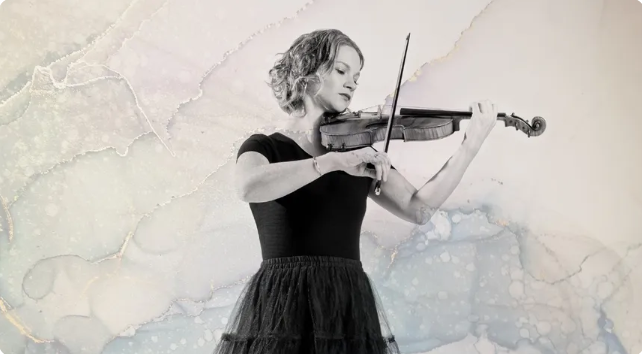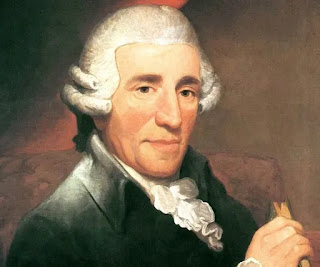The Role of a Performer: Hilary Hahn
When searching for music on a favorite streaming platform, I think we most often search for the piece rather than a particular band, orchestra, or soloist. When we do search for the performer, what are we looking for exactly? In this blog, I will be discussing the role of performers, using Hilary Hahn, an American classical violin performer, as the example.
Hilary Hahn (1979 - present), born in Virginia, began learning to play the violin at age 4 through a Suzuki-method program, quickly moving into private lessons and performed with an orchestra as early as 11 years old. She debuted internationally in Germany at 16 years old and at 20, she obtained a bachelor's degree from the Curtis Institute of Music where she had been admitted at 10 years old. Hahn's professional life has included international performances, recording contracts with big names such as Sony, receiving three Grammy Awards, and so much more. Hahn is known for her lively and interpretive style and I have come to really enjoy her performances despite knowing little about string performance in general.
While I know relatively little about the nuance of violin performance, I think that plays to my advantage when discussing the role of a performer. Members of the audience typically know little about music composition, but they do know how the music makes them feel. It is almost entirely up to the performer to make the music enjoyable, sorrowful, or to create any other effect they would like for their audience. One might think that all a performer does is accurately play what the composer has written, and if they do so successfully, the music will naturally be impactful. However, I can say from personal experience as a performer (student) and listener, that when all that a performer does is play what is written, the music that comes from it is entirely emotionless and often produces a sense of anxiety because the performer sounds like they don't really know what they are doing. It is a rigid sound, even when played accurately to what the composer wrote down. Some composers give more instruction than others, but all music is essentially up for the interpretation of the player. Markings such as Dolce (Sweetly) or Presto (Very Quickly) are mostly relative terms when combined with other tempo and dynamic markings throughout a piece.
In the first example, Hahn plays Partita for Violin Solo No. 1, BWV 1002 by J.S. Bach, composed around 1720:
https://www.youtube.com/watch?v=iEBX_ouEw1I
The marking that Bach gives for how to play this song is Allamanda, which is a German dance, not a super descriptive term for finding the tempo. It's up to the performer to determine what that means and to use this guideline to give life to the piece. As you listen to the music, notice how this piece could be so boring if the performer's main goal was to display the technical skill it takes to play what Bach wrote. It would feel so monotonic with the very little variation in rhythm. This is not the case, however, as Hahn transforms the piece into lively dance music with all its highs and lows. This does not mean that accuracy is not important, in fact it is essential. You can hear how spot on Hahn's intonation is and how "crystal clear" all her notes are as one commenter put it, but it is the musicality and ability to subjectively interperate a piece that moves a performer from good to extraordinary.
The second piece is Partita No. 3 by Anton Garcia Abril from 6 Partitas, commissioned by Hahn and written in 2019:
https://www.youtube.com/watch?v=oo7ZkkEmYg0
https://www.youtube.com/watch?v=47u0jl56lkU
This piece is another example of how the performer takes a technically challenging and beautiful piece to a whole new level by interpretively meddling with the musical elements. The second link is to a video where Hahn actually gives a short masterclass for this piece where she demonstrates my point perfectly. Some other roles that performers play in contributing to music is putting a new spin on a piece by using different instruments or even changing the genre a little to convey what they would like the audience to experience when listening to their performance. Perhaps my take on it is a little more technical than I set out to be, but I hope it gives a little more insight to what happens after the composer releases his music into the wild, and what makes the difference between an accurate performer and a true musician.
Credits:
Schreiber, Barbara A.. "Hilary Hahn". Encyclopedia Britannica, 12 Mar. 2024, https://www.britannica.com/biography/Hilary-Hahn. Accessed 3 April 2024.
"Hilary Hahn". Los Angeles Chamber Orchestra, 2024, https://www.laco.org/people/hilary-hahn/. Accessed 3 April 2024.
"Solo Violin Partita No. 1 in B Minor - J. S. Bach, BWV 1002". Musescore, 29 May 2019, https://musescore.com/musemeister/bach_1002. Accessed 3 April 2024.




I like what you had to say here about technical accuracy vs. performance. I definitely have a preference for emotion/artistry over technical accuracy in performances (which I’m sure most people do!), though in no way downplaying the importance of accuracy. I have a background in violin, and I’ve heard violin/string performances (usually recitals) that, while done technically quite well, were not very pleasant to listen to — they felt “dead,” as the players were focusing on being accurate, and not letting the music and their responses to it guide them. They were “players” and not “musicians” or “artists.” I felt that they weren’t letting their instruments “sing,” which was sad. Hahn’s example of technical playing in the third video is great — I found myself thinking "pretty, but no emotion,” and then she said basically the same thing, haha.
ReplyDeleteListening to these examples, I think where a lot of Hahn’s strength lies — apart from her technical mastery — is the way she leans into the tone of her violin. She’s playing it for all its worth, reveling in its sound, and you can tell she really enjoys what she’s doing, using rhythm and articulation to make the violin throb with emotion. One might not think attitude toward the instrument would matter as much, and that it’s really only vocals that would easily reveal one’s feelings, but we can tell from her playing that instruments are also sensitive to emotions; she is truly a “musician” who loves what she does. I greatly enjoyed Hahn's performances — thank you for sharing her with us!